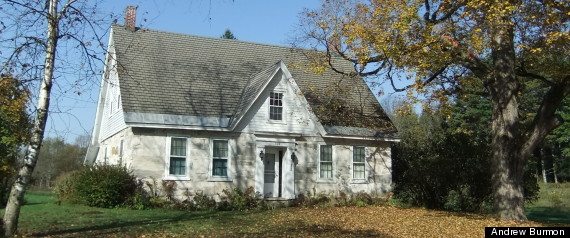Two paths diverge in the woods behind Robert Frost's home in Shaftsbury, Vermont and though he didn't write about those trails while he lived here, it seems poetic that one of them is worn and the other less traveled. That the second path leads hikers into a bramble might also be poetic, but removing thorns from bloodied skin certainly isn't.
In Frost's poetry, nature is a seamless landscape of moral quandaries and ambiguous meditations. In the woods behind his house, it is squishy, hard and occasionally quite sharp.
Robert Frost may be the man most responsible for romanticizing the New England landscape. By painting the nature that surrounded him -- "The mountain stood there to be pointed at" -- in reassuring abstract, Frost created an American equivalent to Wordsworth's Lake District. The New England pastoral became, through Frost's wildly popular work, not only more appealing than the wilderness described by antecedents like Thoreau but also anathema to the urgencies of American individualism.
The most famous poem Frost wrote while living in Shaftsbury, "Stopping By The Woods On A Snowy Evening," famously ends with the repetition of the line "And miles to go before I sleep," but is actually about the world's least hurried trespasser. The whole thing seems terribly profound despite the fact that the narrator, who is watching "the woods fill up with snow," doesn't seem to have any thoughts on the matter. A terribly significant nothing is happening.
Come to Vermont, Frost seems to say. We'll all do nothing together.
The invitation is awfully appealing, especially in fall when the light filters through yellow leaves, turning the forest sepia. Route 7A, which runs past the old stone house, is full of leaf peepers, who have come north on their own time and at their own expense to watch nature do what nature does. They buy Entenmann's cakes and hot, black coffee at the town's rickety general store and apologize for paying with credit cards; not because the lady behind the counter minds but because they seem incongruous.
The rusted hinges on the front door whine because of course they do.
The inside of Frost's home, in keeping with this rustic vibe, doesn't impose any flashy multimedia presentations on visitors. Poetry is tacked to the walls, and the highlight of the exhibits may be seeing the fireplace Frost rocked by on inclement evenings. Poeting is not an equipment-heavy pursuit, so there isn't much to look at outside of the bent glass in the front windows. The staircase, which is off-limits, climbs to a white-washed second floor suffused with light.
That the famed volume Frost wrote here was titled "New Hampshire" seems to indicate that the details of this place are less important than its generalities. Fair enough. It is hard, after all, to observe nature's specifics; trespassers watch snow fall without counting the flakes.
Still, the details are relevant. The tree in his front yard is healthy and wide. A path leads into the woods behind the house. There is nothing profound to be said about these things, but there they are.

















Posted: 10/16/2012 7:21 am EDT Updated: 10/16/2012 12:33 pm EDT